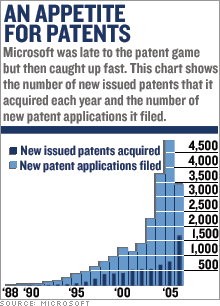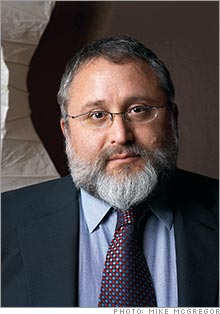Microsoft takes on the free worldMicrosoft claims that free software like Linux, which runs a big chunk of corporate America, violates 235 of its patents. It wants royalties from distributors and users. Users like you, maybe. Fortune's Roger Parloff reports.(Fortune Magazine) -- Free software is great, and corporate America loves it. It's often high-quality stuff that can be downloaded free off the Internet and then copied at will. It's versatile - it can be customized to perform almost any large-scale computing task - and it's blessedly crash-resistant. A broad community of developers, from individuals to large companies like IBM, is constantly working to improve it and introduce new features. No wonder the business world has embraced it so enthusiastically: More than half the companies in the Fortune 500 are thought to be using the free operating system Linux in their data centers.
 But now there's a shadow hanging over Linux and other free software, and it's being cast by Microsoft (Charts, Fortune 500). The Redmond behemoth asserts that one reason free software is of such high quality is that it violates more than 200 of Microsoft's patents. And as a mature company facing unfavorable market trends and fearsome competitors like Google (Charts, Fortune 500), Microsoft is pulling no punches: It wants royalties. If the company gets its way, free software won't be free anymore. The conflict pits Microsoft and its dogged CEO, Steve Ballmer, against the "free world" - people who believe software is pure knowledge. The leader of that faction is Richard Matthew Stallman, a computer visionary with the look and the intransigence of an Old Testament prophet. Caught in the middle are big corporate Linux users like Wal-Mart, AIG, and Goldman Sachs. Free-worlders say that if Microsoft prevails, the whole quirky ecosystem that produced Linux and other free and open-source software (FOSS) will be undermined. Microsoft counters that it is a matter of principle. "We live in a world where we honor, and support the honoring of, intellectual property," says Ballmer in an interview. FOSS patrons are going to have to "play by the same rules as the rest of the business," he insists. "What's fair is fair." Microsoft General Counsel Brad Smith and licensing chief Horacio Gutierrez sat down with Fortune recently to map out their strategy for getting FOSS users to pay royalties. Revealing the precise figure for the first time, they state that FOSS infringes on no fewer than 235 Microsoft patents. It's a breathtaking number. (By comparison, for instance, Verizon's (Charts, Fortune 500) patent suit against Vonage (Charts), which now threatens to bankrupt the latter, was based on just seven patents, of which only three were found to be infringing.) "This is not a case of some accidental, unknowing infringement," Gutierrez asserts. "There is an overwhelming number of patents being infringed." The free world appears to be uncowed by Microsoft's claims. Its master legal strategist is Eben Moglen, longtime counsel to the Free Software Foundation and the head of the Software Freedom Law Center, which counsels FOSS projects on how to protect themselves from patent aggression. (He's also a professor on leave from Columbia Law School, where he teaches cyberlaw and the history of political economy.) Moglen contends that software is a mathematical algorithm and, as such, not patentable. (The Supreme Court has never expressly ruled on the question.) In any case, the fact that Microsoft might possess many relevant patents doesn't impress him. "Numbers aren't where the action is," he says. "The action is in very tight qualitative analysis of individual situations." Patents can be invalidated in court on numerous grounds, he observes. Others can easily be "invented around." Still others might be valid, yet not infringed under the particular circumstances. Moglen's hand got stronger just last month when the Supreme Court stated in a unanimous opinion that patents have been issued too readily for the past two decades, and lots are probably invalid. For a variety of technical reasons, many dispassionate observers suspect that software patents are especially vulnerable to court challenge. Furthermore, FOSS has powerful corporate patrons and allies. In 2005, six of them - IBM (Charts, Fortune 500), Sony, Philips, Novell, Red Hat (Charts) and NEC - set up the Open Invention Network to acquire a portfolio of patents that might pose problems for companies like Microsoft, which are known to pose a patent threat to Linux. So if Microsoft ever sued Linux distributor Red Hat for patent infringement, for instance, OIN might sue Microsoft in retaliation, trying to enjoin distribution of Windows. It's a cold war, and what keeps the peace is the threat of mutually assured destruction: patent Armageddon - an unending series of suits and countersuits that would hobble the industry and its customers. "It's a tinderbox," Moglen says. "As the commercial confrontation between [free software] and software-that's-a-product becomes more fierce, patent law's going to be the terrain on which a big piece of the war's going to be fought. Waterloo is here somewhere." Party crasher Brad Smith, 48, became Microsoft's senior vice president and general counsel in 2002, the year the company settled most of its U.S. antitrust litigation. A strawberry-blond Princeton graduate with a law degree from Columbia, Smith is a polished, thoughtful and credible advocate whom some have described as the face of the kinder, gentler, post-monopoly Microsoft. But that's not really an apt description of Smith; he projects intensity, determination, a hint of Ivy League hauteur, and ambition. We're sitting at a circular table in Smith's office in Building 34 on the Redmond campus, with a view of rolling green lawns splashed with pink-blossomed plum trees. In the 1970s and 1980s, Smith recounts, software companies relied mainly on "trade secrets" doctrine and copyright law to protect their products. Patents weren't a big factor, since most lawyers assumed that software wasn't patentable. But in the 1990s, all that changed. Courts were interpreting copyright law to provide less protection to software than companies had hoped, while trade-secrets doctrine was becoming unworkable because the demands of a networked world required that "the secret" - the program's source code - be revealed to ever more sets of eyes. At the same time courts began signaling that software could be patented after all. (A copyright is typically obtained on an entire computer program. It prohibits exact duplication of the code but may not bar less literal copying. Patents are obtained on innovative ways of doing things, and thus a single program might implicate hundreds of them.) In response, companies began stocking up on software patents, with traditional hardware outfits like IBM leading the way, since they already had staffs of patent attorneys working at their engineers' elbows. Microsoft lagged far behind. As with the Internet, though, Microsoft came late to the party, then crashed it with a vengeance. In 2002, the year Smith became general counsel, the company applied for 1,411 patents. By 2004 it had more than doubled that number, submitting 3,780. In 2003, Microsoft executives sat down to assess what the company should do with all those patents. There were three choices. First, it could do nothing, effectively donating them to the development community. Obviously that "wasn't very attractive in terms of our shareholders," Smith says. Alternatively, it could start suing other companies to stop them from using its patents. That was a nonstarter too, Smith says: "It was going to get in the way of everything we were trying to accomplish in terms of [improving] our connections with other companies, the promotion of interoperability, the desires of customers." So Microsoft took the third choice, which was to begin licensing its patents to other companies in exchange for either royalties or access to their patents (a "cross-licensing" deal). In December 2003, Microsoft's new licensing unit opened for business, and soon the company had signed cross-licensing pacts with such tech firms as Sun, Toshiba, SAP and Siemens. At the same time, Smith was having Microsoft's lawyers figure out how many of its patents were being infringed by free and open-source software. Gutierrez refuses to identify specific patents or explain how they're being infringed, lest FOSS advocates start filing challenges to them. But he does break down the total number allegedly violated - 235 - into categories. He says that the Linux kernel - the deepest layer of the free operating system, which interacts most directly with the computer hardware - violates 42 Microsoft patents. The Linux graphical user interfaces - essentially, the way design elements like menus and toolbars are set up - run afoul of another 65, he claims. The Open Office suite of programs, which is analogous to Microsoft Office, infringes 45 more. E-mail programs infringe 15, while other assorted FOSS programs allegedly transgress 68. Now that Microsoft had identified the infringements, it could try to seek royalties. But from whom? FOSS isn't made by a company but by a loose-knit community of hundreds of individuals and companies. One possibility was to approach the big commercial Linux distributors like Red Hat and Novell that give away the software but sell subscription support services. However, distributors were prohibited from paying patent royalties by something whose very existence may surprise many readers: FOSS's own licensing terms. |
Sponsors
|



